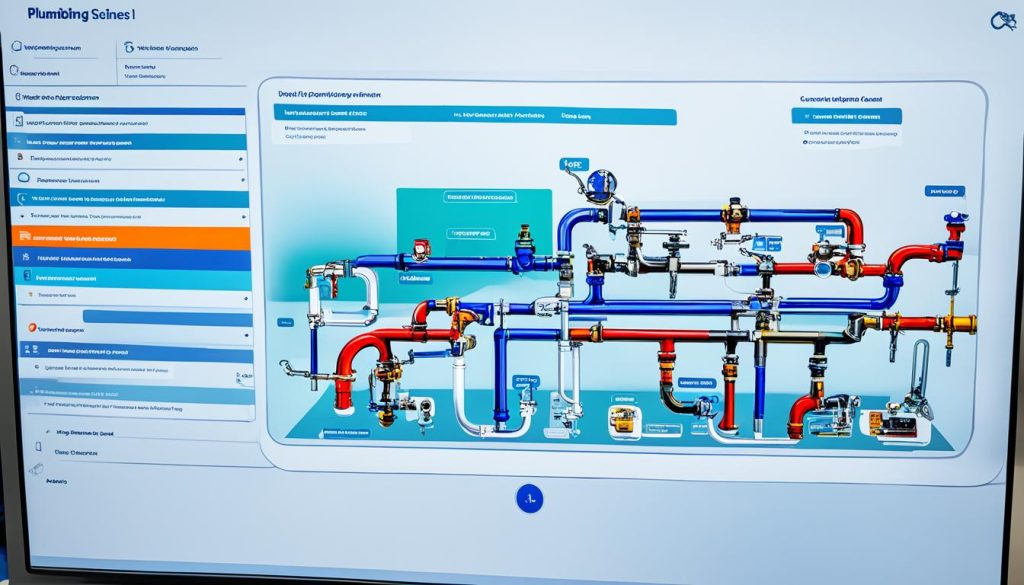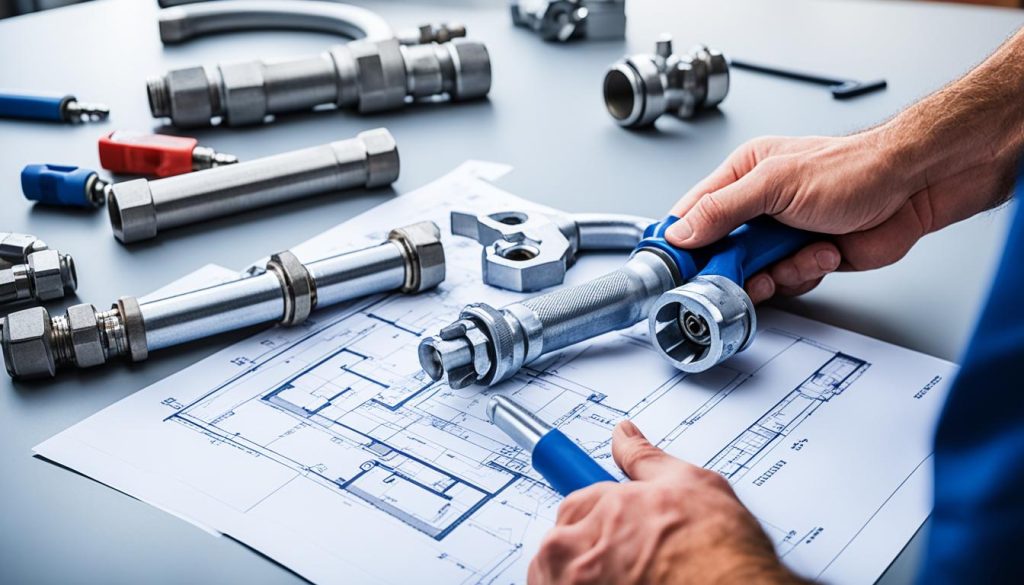Plumbing Trade School or Apprenticeship Path Guide
Did you know that the demand for skilled plumbers in Canada is projected to increase by 9% over the next decade? With a growing population and aging infrastructure, there is a pressing need for trained professionals to handle plumbing installations and repairs. Whether you’re considering a career change or starting your journey in the skilled trades, understanding the options available to you is crucial. In this guide, we will explore the differences between a plumbing trade school and apprenticeship, helping you make an informed decision about your professional education.
Key Takeaways:
- Both plumbing trade schools and apprenticeships offer pathways to becoming a certified plumber.
- Trade schools provide focused training, while apprenticeships offer hands-on learning opportunities.
- Consider your learning style and career goals when deciding between the two options.
- Plumbing trade schools often have flexible program options, including online courses.
- Apprenticeships offer the chance to earn while you learn and gain practical experience.
What is an Apprenticeship?
An apprenticeship is a post-secondary education program that combines on-the-job training with technical instruction. As an apprentice plumber, you will work under the guidance of a certified journeyperson or qualified tradesperson for approximately 80% of your time. The remaining 20% involves attending technical training at a post-secondary institution, usually a college or technical institute. Throughout the apprenticeship, you will learn the necessary theory, skills, and codes governing plumbing installations. Upon completion, you will be eligible for plumbing certification and equipped to install and service various plumbing systems.
Apprenticeship Structure
During your apprenticeship, you will follow a structured training plan that combines practical experience with classroom learning. Here’s a breakdown of the typical apprenticeship structure:
| Component | Description |
|---|---|
| On-the-job Training | Under the supervision of a certified journeyperson or tradesperson, you will gain hands-on experience in plumbing installations, repairs, and maintenance. |
| Technical Instruction | You will attend classes at a post-secondary institution to learn the theoretical aspects of plumbing, including codes, regulations, and industry best practices. |
| Progression | Apprenticeships typically consist of multiple levels or periods, with each stage building upon the previous one. As you progress, you will take on more complex tasks and responsibilities. |
| Final Certification | After completing the required training hours and passing any necessary exams, you will obtain your plumbing certification, enabling you to work independently as a licensed plumber. |
Embarking on an apprenticeship provides a comprehensive approach to learning the plumbing trade, combining hands-on experience with technical knowledge. This combination prepares you for a successful career as a certified plumber.
Benefits of a Plumbing Trade School
Attending a plumbing trade school offers several advantages. Firstly, trade schools provide focused training solely on plumbing, allowing you to gain in-depth knowledge and hands-on experience in a shorter period compared to an apprenticeship.
Additionally, trade schools often offer flexible options, including online courses, which can accommodate different schedules and learning preferences. This means you can pursue your plumbing education at your own pace, whether you have other commitments or prefer the convenience of online learning.
Trade schools also have industry connections and partnerships, providing networking opportunities and potential job placements upon completion of the program. These connections can be invaluable for jumpstarting your plumbing career and finding employment in the industry.
Choosing the Right Plumbing Trade School
When selecting a plumbing trade school, it’s important to consider factors such as accreditation, curriculum, faculty expertise, and job placement assistance. Research different plumbing schools and compare their offerings to find the one that best aligns with your career goals and educational needs.
Advantages of an Apprenticeship
Opting for an apprenticeship offers numerous benefits for aspiring plumbers. This hands-on training program provides the opportunity to learn while earning a wage, making it an attractive option for individuals seeking practical skills and real-world experience. Under the guidance of experienced professionals, apprentices gain invaluable knowledge and expertise in tackling various plumbing challenges.
One of the key advantages of an apprenticeship is the opportunity to earn industry certifications and journeyperson status. By completing the required training and accumulating the necessary on-the-job hours, apprentices can enhance their professional credibility and expand their career prospects in the plumbing industry.
Moreover, many employers prefer to hire apprentice graduates, making apprenticeships a direct pathway to employment. This offers apprentices a distinct advantage in securing job opportunities upon completion of their training.
Benefits of an Apprenticeship:
- Hands-on training from experienced professionals
- Opportunity to earn industry certifications and journeyperson status
- Direct pathway to employment
To illustrate the advantages further, here is a comparison between a plumbing apprenticeship and a plumbing trade school:
| Advantages | Plumbing Apprenticeship | Plumbing Trade School |
|---|---|---|
| Hands-on Experience | ✅ | ❌ |
| Industry Certifications | ✅ | ❌ |
| Direct Pathway to Employment | ✅ | ❌ |
Finding the Right Path for You
When considering your options for professional plumbing education, it’s important to find the right path that aligns with your personal preferences, learning style, and career goals. Whether you choose a plumbing trade school or an apprenticeship, both avenues offer valuable opportunities for skilled trades education in Canada.
If you thrive in a structured learning environment that combines comprehensive theoretical knowledge with hands-on practical training, a plumbing trade school may be the ideal choice for you. Trade schools specialize in providing focused education solely in the field of plumbing, allowing you to gain in-depth knowledge and expertise in a shorter period compared to an apprenticeship. Additionally, many trade schools offer flexible options, such as online courses, which can accommodate different schedules and learning preferences.
On the other hand, if you value hands-on learning, the opportunity to earn a wage while gaining direct industry experience, and the potential for industry certifications and journeyperson status, an apprenticeship may be the right path for you. Apprenticeships provide you with the chance to work under the guidance of experienced professionals, learning from real-world plumbing scenarios. This practical experience is invaluable for developing essential skills and knowledge in the field.
Ultimately, the decision between a plumbing trade school and apprenticeship should be based on a thoughtful evaluation of available programs, curriculum, and personal aspirations. Research the options, speak with industry professionals, and carefully consider the learning environment and career opportunities that each path offers. By doing so, you can make an informed choice that sets you on a rewarding journey in the plumbing trade.
Source Links
- https://tradesecrets.alberta.ca/trades-in-alberta/profiles/006/
- https://www.sait.ca/apprenticeships-and-trades/programs/plumber
- https://tradesecrets.alberta.ca/SOURCES/PDFS/CURRICULUM_GUIDES/006_OUTLINE.PDF
- Investing Wisely: How Windows & Doors in Boost Property Value and Financial Health - April 24, 2025
- The Financial Impact of Personal Injuries: Why Legal Help Matters for Business Owners - April 16, 2025
- The Hidden Financial Costs of Domestic Assault: What Business Owners Need to Know - April 16, 2025













